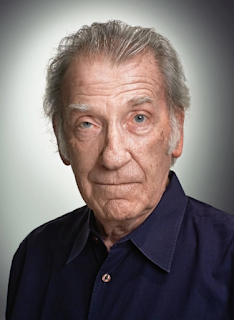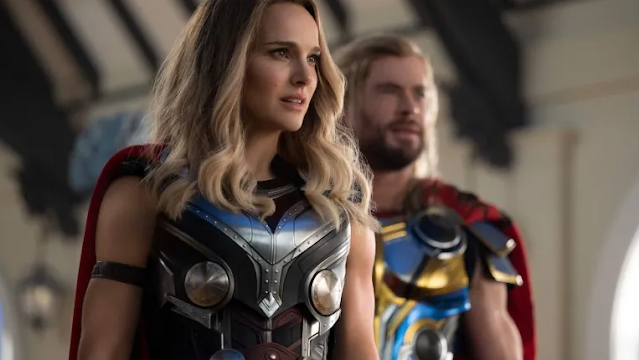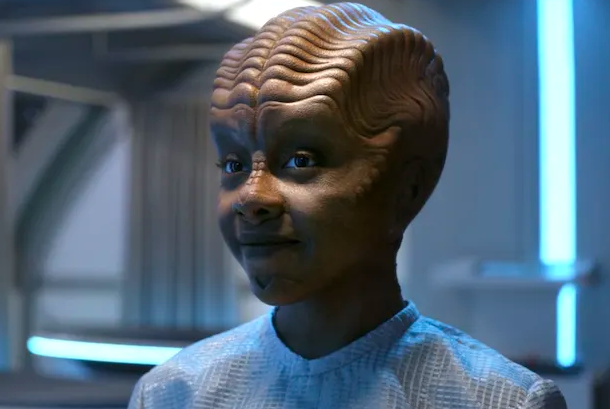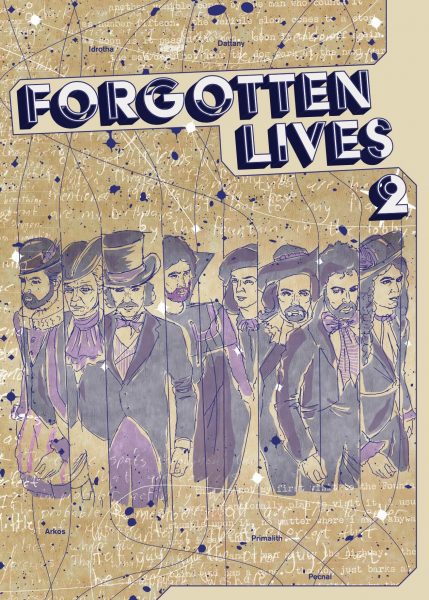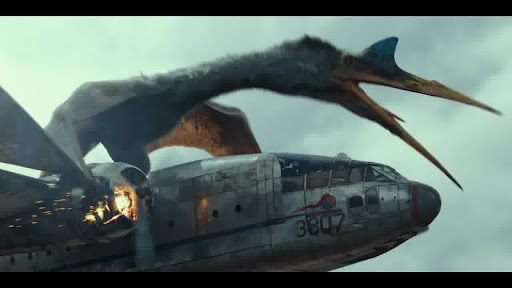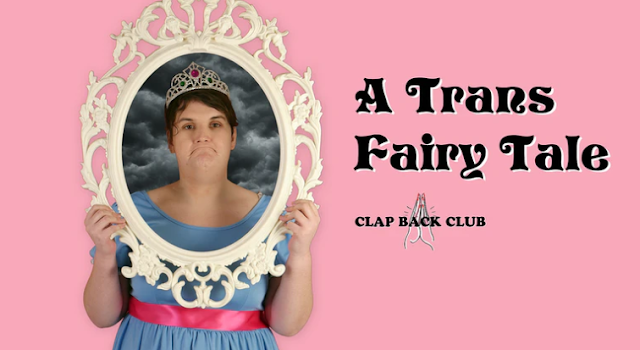SPOILERS FOR EPISODE FIVE
The Orville:
New Horizons continues to
deliver relevant surprising and important stories in its revitalised
third season. The five episodes released so far have, on the whole,
been excellent. After the powerful season opener, “Electric Sheep,”
“Shadow Realms” built on the Krill-Union storyline while
delivering an effective sci-fi horror story. Episode four, “Gently
Falling Rain,” was a thriller with spectacular visuals, strong
action and some genuinely touching moments. Further developing the
Krill storyline, it commented on political popularism, while briefly
taking a swipe at the abortion debate and religious extremism on the
whole. Only the third episode, the throwaway “Mortality Paradox,”
failed to really make an impact; obvious filler that isn't really
about anything.
With
episode five, though, the series reaches its zenith with the
controversial and beautiful “A tale of Two Topas.” Once again,
the series delves into the long-running storyline concerning the
Moclans, their contentious culture, and their strained relationship
with the rest of the Union. This kicked off right back at the very
beginning of the programme, in episode 1.3, “About a Girl,” which
introduced the truth of the Moclan civilisation: that although they
are seemingly a world entirely of gay men, who can and do reproduce
with each other, hatching baby boys, females of their species do
exist. When Lt. Cmdr Bortus (Peter Macon) and his civilian husband
Klyden (Chad L. Coleman) have a baby girl, the two men fall out over
the decision to have her surgically altered into a boy, the standard
Moclan practice.
That
episode didn't quite come off, in spite of its lofty ambitions, in
part because it tried to address too many issues at once.
Nonetheless, it was impactful, and the consequences for Moclan
culture continued in the later episode, “Sanctuary” (2.12),
further exposing the existence of Moclan women. Bortus and Klyden's
relationship also suffered, coming to a head in 2.2, “Primal
Urges,” while Moclan culture's misogyny was further explored in
2.7, “Deflectors,” where Lt. Keyali entered a forbidden
relationship with a Moclan man. These episodes managed better than
“About a Girl” by focusing their stories on particular elements
of the Moclan debate, hitting home harder as a result.
The Orville
has continued to improve as it
has developed and moved further from its comedy roots, and “A Tale
of Two Topas” is once again an affecting, meaningful sci-fi story
told straight. In the few years since “About a Girl,” Topa has
grown into an adolescent (alien races always being a handy way to
move quickly past the infant stage on TV). Now played by
fifteen-year-old Imani Pullum, Topa is old enough to have decided
that he wants to join the Union fleet and has begun shadowing
Commander Kelly Grayson (Adrienne Palicki) as part of his
preparation. The boy remains completely unaware that he was
surgically altered as a child, or that he was born physically female,
but still feels that there's something wrong with him.
Pullum,
a very new actor, is excellent in her scenes as Topa. The young
Moclan is very clearly depressed, something that comes through more
in his demeanour than his words or actions. There's a visible weight
on his shoulders; it's a remarkably strong and subtle performance.
Palicki, who doesn't always have a great deal to challenge her on the
show, is also very good as Grayson. We see, during Topa's shadowing,
how much of her day-to-day work involves trying to keep the crew,
made up from multiple different species, rubbing along together.
There's a rare outright comedy scene early on where Grayson has to
confront an alien crewman who refuses to wear clothes on the first
day of the month, according to his religion's dictates. It's silly,
but sets the theme of the episode of cultural clashes. Unlike with
the naked crewman, who is persuaded to compromise by wearing pants,
there is no easy resolution to the Moclan situation. (Although it
would have been even simpler to give him the first day of the month
off so he could be naked as he liked in his quarters, but I digress.)
Grayson
is torn between her moral need to tell Topa the truth and save him
misery, and her responsibility as first officer to maintain the peace
and honour the decision that was made on Moclus. It's well played by
Palicki, who hold her own as one of the focal actors of the episode.
Topa's
depression worsens, in spite of Kelly's mentoring, and he begins to
ask Isaac – the recently suicidal android – what it's like to be
dead. For a horrifying moment I feared that the season opener was
going to be followed up by another, irreversible suicide, but that,
while sadly all too believable, would have been devastating. With
this added pressure, Grayson helps Topa discover the truth, with the
help of another, unknown party who provides access to protected
files. What follows is the inevitable, but cathartic, confrontation
between Topa, and, well, everyone in her life, all of whom kept the
truth from her. She is most furious at her fathers, but also feels
deeply betrayed by Grayson. Topa declares that she wishes to be
female, her true self, and by this time Grayson, and soon others,
have begun referring to her with she/her pronouns, the switch
happening almost without notice, it seems so natural.
Bortus
and Klyden's relationship is brutally wounded by this turn of events.
Bortus had long been the one who championed Topa's right to live as
she was born, but agreed to abide by the Moclan government's
decision. The wedge this drove between the husbands seems to have
just about healed by this point, but is reopened violently. Bortus is
revealed as the one who supplied Topa with the password needed to
access the files, while Klyden is as resolutely anti-female as he
ever was. There's an additional level to Klyden's hatred of women,
which has been tolerated as a cultural difference for too long: as
was revealed back in “About a Girl,” he too was born female, and
was altered. Only Klyden now reveals he wishes he had never known
about his “defect,” and that he is merely trying to spare Topa
the same pain.
While
this paints Klyden in a more sympathetic light, there is never any
chance he is going to be portrayed as right here. Bortus is torn up
by the situation, breaking down in tears in a truly heartbreaking
moment when he opens up to Kelly about it. Macon, who so often has to
play the Moclan officer as stoic and resolute, is absolutely
incredible in this scene. From here there is some debate among the
command crew over what to do with Topa, who wishes to undergo gender
reassignment surgery to undo the change that was made to her without
ther consent. This only requires the permission of one parent, and
Bortus consents, but Captain Mercer (Seth MacFarlane) is worried
about the reaction from the Moclans. Predictably, the Union Council
refuses to allow the procedure, fearing that the Moclans will pull
out of the Union when their help is needed against the twin threats
of the Kaylon and the Krill.
The
episode could have ended like this, with the decision of those in
power overruling that of the person who is suffering, as is so often
the case in real life. However, the crew find a loophole that allows
the operation to be completed without implicating the Union. Really,
though, I doubt the Moclans would have ever gone through with their
threat to secede from the Union: like Klyden, while their beliefs are
strong, they are full of sound and fury but ultimately weak.
After
her operation (far, far simpler and quicker than in reality, but
then, isn't that what we hope for such things?), Topa once again has
a body that aligns with her identity. Aided by only subtle changes in
make-up, Pullum once again impresses by making this version of Topa
clearly female where appeared male before. Again, the subtlety of her
performance is astounding. While it's a happy ending, there's still a
sting, as Klyden, appallingly, disowns his daughter, saying he wishes
she'd never been born, abandoning her and Bortus. Again, all too
believable.
The
genius of the Moclan storyline has always been how closely it
reflects debates in real life, but then puts them into sharp focus by
inverting them. While on 21st
century Earth, people in same-sex relationships still face
discrimination, either illegally or enshrined in their country's law,
the Moclans are all homosexual men, save for a few who are treated as
pariahs. Topa pleas not just for gender reassignment surgery, but
what is really a “de-transitioning.” This could have gone badly
wrong had the episode not been written and performed as well as it
was, ending up backing the common, but entirely false, claim that
many transgender people regret their surgery. Instead, it's presented
in the same way as the Moclans' sexuality: how dare you be straight!
How dare you be cisgender!
The
only element that aligns directly to real life is the Moclans'
misogyny, which is all too common, and indeed a fundamental part of
some cultures' ruling regimes. In “About a Girl” this veered
close to xenophobia and racism, but here it's handled with more care.
Still, it's hard not to agree with Mercer when he asks “How long do
we put up with this?” Some cultural views are so aborrent to
outsiders that it seems there can be no compromise. However, by
refusing to engage with each other, there can be no learning. Still,
it remains an element with a strong parallel in the 21st
century.
A
risky episode then, but one that comes off with great success, thanks
to the skilled writing and direction of MacFarlane, and the
performances of Palicki, Macon, Coleman and, above all, Pullum.



